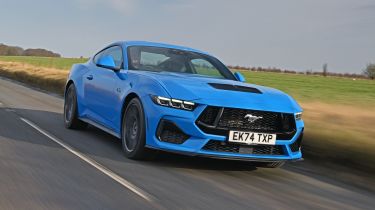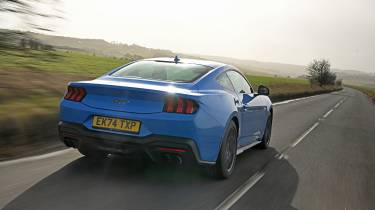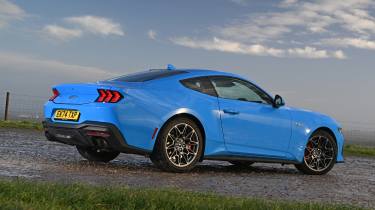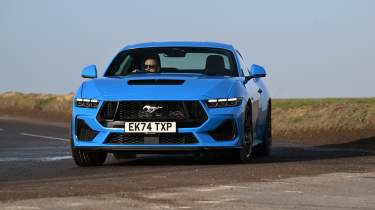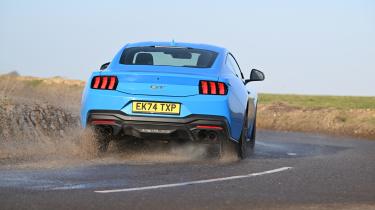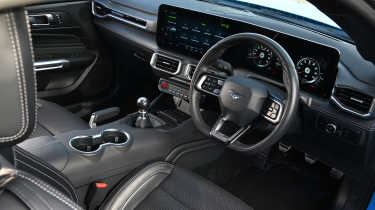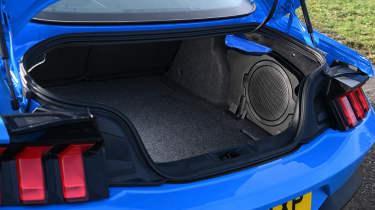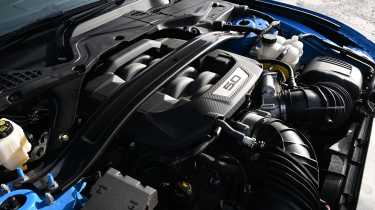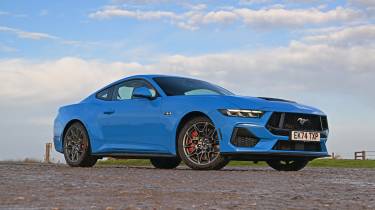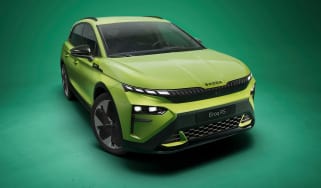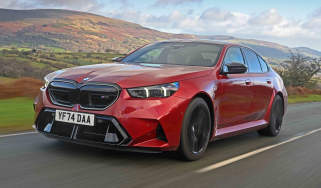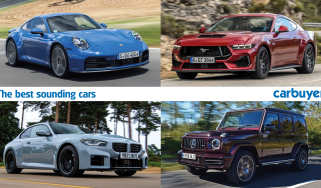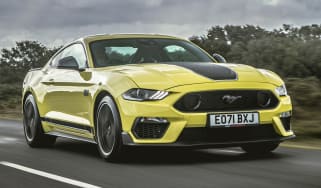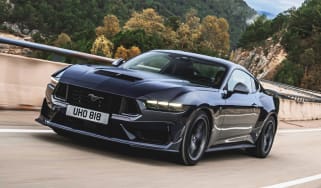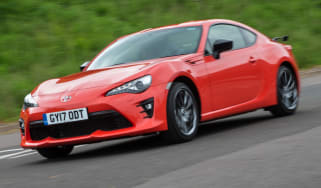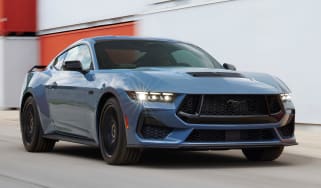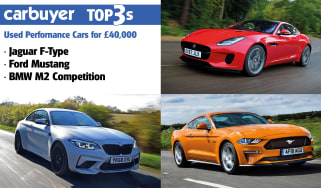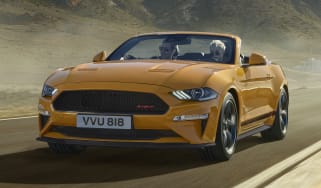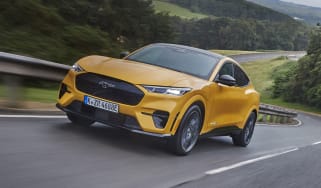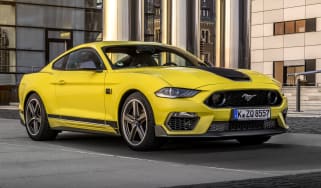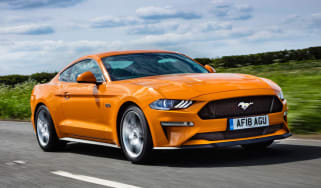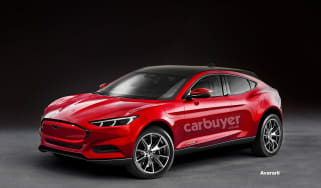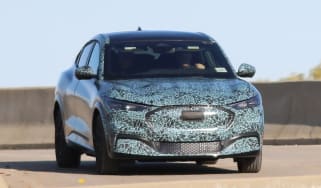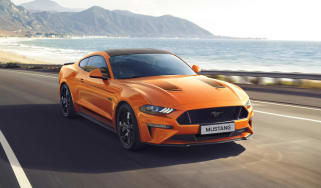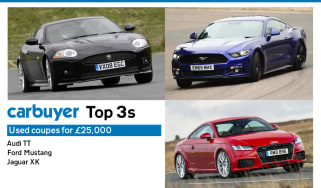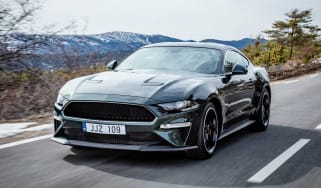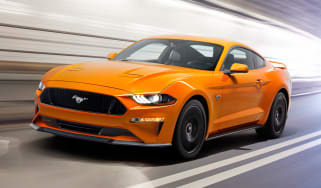Ford Mustang review – a great-value V8 sports car
“With its big petrol V8 engine, the Ford Mustang is one of the last of a dying breed of sports cars”
Pros
- Fun to drive
- V8 engine sounds great
- Good value
Cons
- Horrendous fuel economy
- Rivals have bigger boots
- Interior lacks sparkle
Verdict – is the Ford Mustang a good car?
The Ford Mustang is the last of a fading era of old school sports cars, yet it feels more modern and capable than ever. It’s exciting and fun to drive, while still sporting a ridiculously large 5.0-litre V8 engine with loads of character and an enthralling soundtrack. It’s comfortable and practical, too, meaning you could happily use it every day – so long as you can afford the eye-watering fuel bills. Look past that, and the Ford Mustang really feels like a lot of sports car for the money.
Ford Mustang models, specs and alternatives
Is there a more recognisable name in the motoring world than the Ford Mustang? We’re not so sure – the American sports car has been winning over fans with its muscular styling, driving thrills and V8 soundtrack since the mid-60s, propelling it to automotive icon status.
But UK customers have missed out on the fun until fairly recently. It was only in 2015 that Ford decided to bring the Mustang to our side of the pond in right-hand drive, giving UK drivers a taste of America’s pony car. Fast forward a decade and the Mustang is more sophisticated than ever and still available in right-hand drive, costing from around £56,000.
More reviews
In-depth reviews
Road tests
The seventh-generation Mustang arrived in 2024, using an updated platform and engine from the previous car. It gets a sleek design with thinner headlights than before and a slightly more angular look all-round, for a more modern take on a well-established recipe. On the inside there’s lots of modern equipment, like the dual-screen infotainment and digital dials, so the Mustang feels more up-to-date than ever.
Underneath the bonnet, the latest Ford Mustang sticks to the good old-fashioned recipe of V8 petrol power and drive goes through the rear wheels alone. There’s no clever electrified wizardry here, just a great big growling 5.0-litre unit with up to 447bhp. While the last Mustang was somewhat controversially also offered with a turbocharged four-cylinder EcoBoost engine like the one in the Ford Focus ST, there’s no such option this time around.
The latest Mustang is offered in GT or Dark Horse guises. GT is the standard model with a slightly more pedestrian look, while the Dark Horse stands out with a spoiler, more aggressive bodykit and hood vents plus a raft of performance upgrades, including a more sophisticated suspension setup for improved handling. You’ll need to be a keen driver to spring for this model, however, as it commands an extra £12,000 over the GT.
The Ford Mustang can also be chosen in ‘Fastback’ coupe guise or with a convertible roof, the latter of which adds around £3,500 to the list price.
| Trim levels | Power options |
|
|
There are currently discounts on the recommended retail price of Ford Mustang models via our sister site Auto Express' marketplace
MPG, running costs & CO2 emissions
If fuel-efficiency and running costs are a concern when it comes to buying a sports car, then you may as well stop here – the Ford Mustang with its great big 5.0-litre V8 is a terrible choice when it comes to fuel economy and emissions. If there’s one saving grace, it’s the fact that the Mustang’s sub-£56k list price makes it quite a bargain compared to rival sports cars.
While that may be the case, make sure you factor in the costs in fuel, tax and insurance before you make your mind up. We suspect most drivers will be eyeing a Mustang as a second (or even third) car for weekends and sunny evening drives, so in this context its thirst for petrol may be less of a concern. That said, you’ll see far better fuel economy from the considerably lighter Alpine A110, which returned around 35mpg during our testing.
The Mustang Dark Horse is slightly more powerful than the GT but there’s an almost negligible difference in efficiency, though it does cost more to buy in the first place. You can choose the Mustang GT Fastback, Convertible and Dark Horse with either an automatic or manual transmission, but again, the difference in mpg here is negligible with all models sitting in the low 20s.
| Model | Fuel economy | CO2 emissions |
| Ford Mustang GT manual | 23.5mpg | 274g/km |
| Ford Mustang GT automatic | 23.3mpg | 277g/km |
| Ford Mustang Dark Horse manual | 23.2mpg | 279g/km |
| Ford Mustang Dark Horse automatic | 22.8mpg | 282g/km |
| Ford Mustang GT convertible manual | 23mpg | 280g/km |
| Ford Mustang GT convertible automatic | 22.8mpg | 282g/km |
How much will the Ford Mustang cost in tax?
The Ford Mustang costs over £40,000 so it’s liable for the premium car tax surcharge of £410 a year from year two to six of its life on the road. That’s on top of the standard VED (road tax) rate of £190 per year.
What will the Ford Mustang cost to insure?
As you’d expect of the sporty rear-wheel drive Ford Mustang with its big powerful engine, insurance is expensive. The entry-level GT Fastback sits in insurance group 44 out of 50, though the hardcore Dark Horse falls into group 48, which is two groups from the top. For context, the Porsche Cayman sits in groups 42 to 46, so is actually slightly cheaper to insure, while insuring the Boxster is about as expensive as the Mustang as it sits in groups 44 to 49.
Engines, drive & performance
Of course, the main reason you might buy a car like the Ford Mustang is for how it drives, and Ford has resisted the temptation to water down the age-old V8 recipe. As a result, you get that no-nonsense snarl from in front of you as you start the engine which makes for a lot of theatre before you’ve even set off.
Ford claims the latest Mustang is a lot sharper and more sport-car-focused than before, and we’d agree. There’s a mechanical limited-slip differential which helps to put all that power down through the rear wheels, while the suspension strikes just the right balance between composure and comfort. The Mustang feels incredibly agile through the corners thanks to its brilliant brakes and sharp, precise steering that feels well-weighted, although its large size and heavy weight can take a bit of getting used to initially.
That weight is worth mentioning. Even the lightest Mustang weighs in at over 1,800kg, which is fairly porky for a sports car. In isolation, the Mustang handles this mass exceptionally well, but it can’t match the agility of a lightweight like the Alpine A110. The French featherweight is over 700kg lighter than the Ford, and while it misses out on that V8 rumble, it remains the benchmark sports car for feedback, precision and driver engagement.
But for some buyers, a characterful V8 engine will outweigh those three accolades. The Mustang is also the better long-distance cruiser, happily settling into a motorway slog with its smooth suspension and low-down grunt. The big, comfy seats help in this department, too.
Unlike many other modern cars, including the Alpine, the Mustang is still offered with a six-speed manual gearbox as standard. While the optional 10-speed automatic does shift more quickly, we’d recommend keen drivers go for the manual, which makes for a more involving driving experience. Dark Horse models get an upgraded six-speed manual gearbox built by Tremec, which Ford claims is more durable when driven hard on a race track.
While the convertible is a nice option when the weather’s nice, we’d recommend going for the Fastback coupe because it makes the car much stiffer and better to drive as a result.
Petrol models
Unlike the previous-generation model, there’s no longer a four-cylinder EcoBoost Mustang, although that was at odds with the spirit of the traditional ‘pony car’ anyway. Instead there’s just one 5.0-litre V8 petrol engine offered, coming with 440bhp in GT guise and 447bhp for the Dark Horse model. It’s probably one of the best-sounding engines currently on sale at any price, and feels far more special than the smaller, turbocharged engines in rivals.
| Model | Power | 0-62mph | Top speed |
| Ford Mustang GT manual | 440bhp | 5.4 seconds | 155mph |
| Ford Mustang GT automatic | 440bhp | 5 seconds | N/A |
| Ford Mustang Dark Horse manual | 447bhp | 5.2 seconds | N/A |
| Ford Mustang Dark Horse automatic | 447bhp | 4.4 seconds | N/A |
| Ford Mustang GT convertible manual | 440bhp | 5.4 seconds | N/A |
| Ford Mustang GT convertible automatic | 440bhp | 5 seconds | N/A |
Interior & comfort
The Ford Mustang has come a long way since its origins in the 1960s, and nowhere is that more apparent than on the inside, where the latest model sports lots of digitised technology. All of the instruments are displayed on a dual display stretching from in front of the driver and into the centre of the dash. The interior isn’t quite as premium in feel as that of a BMW M4, Porsche or other sports car, but you’re still getting a lot of car for the price with the Mustang.
Is the Ford Mustang’s infotainment and sat-nav system easy to use?
Admittedly the new dual-screen instrument cluster and infotainment won’t be for everyone, but we think they display information in an easy-to-use and clear way. The more we interacted with the system, the more natural it felt to use. We like the way the displays curve round to cocoon the driver, giving a very focused feel. There’s Android Auto and Apple CarPlay compatibility, so you can opt to use those if you wish.
Key features | |
|
GT
|
Dark Horse (GT plus…)
|
Boot space, practicality & dimensions
The Mustang is quite a large sports car, which equates to a fairly spacious area for the front passenger and driver. You even get a pair of seats in the back, which makes it a little more usable day to day. These rear seats are quite small, however, so they’ll only really be useful to transport children or very small adults in a pinch if necessary. At least they have ISOFIX points, so fitting a child seat won’t be an issue.
Headroom will be limited because of the sloping rear window and there’s very little legroom – competitors such as the BMW 4 Series Coupe are a little more spacious back there. Compare the Mustang to the two-seater Alpine A110, however, and the Ford is far more usable day-to-day.
| Size comparison | |||
| Model | Length | Width | Height |
| Ford Mustang | 4,810mm | 1,916mm | 1,382mm |
| BMW 4 Series Coupe | 4,768mm | 1,852mm | 1,383mm |
| Porsche Cayman | 4,380mm | 1,801mm | 1,266mm |
| Alpine A110 | 4,510mm | 1,865mm | 1,252mm |
Does the Ford Mustang have a big boot?
The Ford Mustang has a big boot in sports car terms, although some rivals offer more capacity, like the BMW 4 Series Coupe or the Porsche Cayman with its front and rear boots (it’s mid-engined). That said, it has far more luggage space than the Alpine A110, which makes do with half of the Ford’s cargo capacity.
| Boot space comparison | |
| Model | Boot space |
| Ford Mustang | 381 litres |
| BMW 4 Series Coupe | 440 litres |
| Porsche Cayman | 405 litres (split front and back) |
| Alpine A110 | 190 litres (split front and back) |
Reliability & safety
Ford doesn’t perform particularly well in terms of customer satisfaction in our Driver Power owner satisfaction surveys, with the brand coming in 30th place out of 32 manufacturers in 2024. We’re happy to report, however, that the amount of buyers that reported an issue with their Ford in the first year (20.8%) was lower than average. It’s worth noting that Porsche has routinely performed well over the last couple of years for customer satisfaction, despite 36% of owners reporting an issue with their Porsche in the first year.
How safe is the Ford Mustang?
The Ford Mustang has yet to be tested by Euro NCAP. If and when it is tested, the brand will be hoping to achieve a better score than the previous model’s three-star rating for safety in 2017. This time around there’s more safety tech included on the Mustang, such as autonomous emergency braking traffic sign recognition and lane keep assist.
Should you buy a Ford Mustang?
With the ban on the sale of petrol and diesel cars looming on the horizon, there’s a chance this could be the last Ford Mustang with a burbling V8 petrol engine. Sports cars seem like a rarity these days, but the Mustang is one of the greats and at £56k it looks like good value.
The V8 engine sounds great and adds to the excitement of the driving experience, while the car itself puts its power down well and is more agile than you might expect of a car its size.
The latest Mustang ups the ante on the tech front, too, although some buyers may lament the loss of the more traditional looking instrument cluster of previous models. The digital instrument display and infotainment is easy to use and feels very driver-focused, although the interior doesn’t look as premium as that of many German rivals.
While we think the Mustang is a bargain for what it is, you’ll need to factor in the horrendous running costs as it’s very thirsty, expensive to insure and incurs the extra tax surcharge for cars costing over £40,000. The Mustang is hard to dislike, though, and if you’re in the market for a sports car with a traditional recipe but lots of modern niceties on the inside, then saddle up.
What is the best Ford Mustang for keen drivers?
While the ultimate enthusiasts might say you need to spring for the Dark Horse, we think at £56k the standard Ford Mustang GT Coupe with a manual gearbox is the one to go for. While the automatic is quicker, it’s not all about speed, and the six-speed manual transmission is more fun to use. Go for the Coupe, too, because its roof adds extra rigidity to the chassis which makes it sharper to drive.
Ford Mustang alternatives
There aren’t so many sports cars and coupes to choose from these days, but there are still a few that you might consider in the same price range as the Ford Mustang from German rivals at BMW and Porsche, or even the left-field Alpine A110.
How we tested the Ford Mustang
We drove the latest Ford Mustang at its international launch event in mid-2024. In 2025, we tested it head-to-head against the Alpine A110 on British tarmac.
Which Is Best?
Cheapest
- Name5.0 V8 GT 2dr
- Gearbox typeManual
- RRP£56,325
Most Economical
- Name5.0 V8 GT 2dr
- Gearbox typeManual
- RRP£56,325
Fastest
- Name5.0 V8 Dark Horse 2dr Auto
- Gearbox typeSemi-auto
- RRP£70,595
